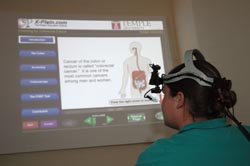|
In essence, the same way that a car company determines how to sell you a car may be the same way a doctor will determine how to sell you on getting screened for life-threatening diseases.
“Making medical decisions can be a complicated process, and without the proper information, patients can feel uncertain and uneasy about their choices. Perceptual mapping can help to alleviate some of that anxiety by giving doctors the information that directly addresses the major concerns of their patients,” Dr. Ruzek said.
The research team will also include Karen Lin, M.D., M.P.H., Brian Meyer, M.D., M.P.H., and Stephanie Ward, M.D., M.P.H., assistant professors of medicine in the Department of Internal Medicine at the School of Medicine.
The researchers will look specifically at how African Americans make the decision to get screened for colorectal cancer. African Americans have a higher rate of occurrence and an earlier onset of this type of cancer than other racial/ethnic groups and have the lowest rates of screening.
As an initial stage in the research process, the researchers are conducting focus groups to determine perceived barriers to colorectal cancer screening, including cancer beliefs, fear of pain, cost and time away from work. Answers will be plotted on a grid to see which factors create the highest level of uncertainty among the group members. Then an educational message will be developed that will address patients’ greatest areas of uncertainty.
In the new Risk Communications Lab in the College of Health Professions, the researchers will be able to test the effectiveness of the messages by analyzing eye focus patterns, pupil dilation, heart rate and brain activity, all of which reveal the patient’s response to the message. These physical data can then be analyzed to see if patients given the educational messages have had their uncertainty about getting screened reduced.
“The perceptual maps allow us to see inside the minds of patients to learn how we can communicate more effectively with them,” Gordon said.
Over the past three decades, breast and prostate cancer screening have become increasingly successful as education and awareness campaigns have made the tests socially acceptable to talk about, Ruzek said, adding that as a result, these types of cancer have been brought to the forefront of the nation’s collective mind, and are better known than colorectal cancer.
“Our research with physicians’ perceptions of screening show that these types of cancers are the best known and patients are more likely to be screened for them, because of media attention,” Ruzek said. “But many doctors say their patients have never even heard of colorectal cancer until they bring it up, and they wish they weren’t the first ones to have to tell their patients about it.”
|
